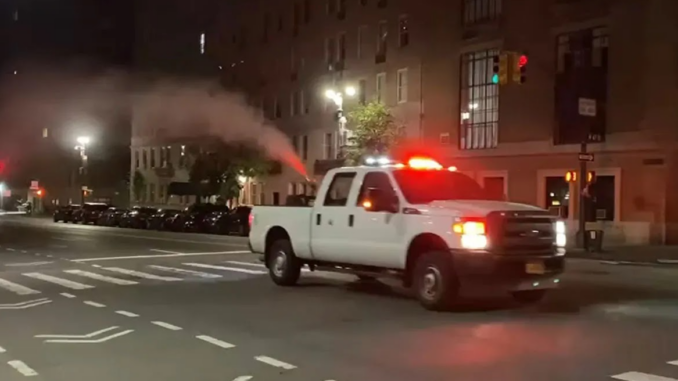
By Victoria Keraj
Due to an increased number of mosquitoes that have tested positive for the West Nile virus (WN) in New York, the Department of Health and Mental Hygiene (DOHMH) is spraying high-risk areas with insecticides. Trucks made the rounds with mosquito adulticide in the early morning hours on Sept. 12, 16, and 18 in Brooklyn and Queens, as was announced on the NYC Health Mosquito Control page.
Residents are advised to stay inside during the spraying to minimize exposure, according to a press release by NYC Health on Aug. 9. To city officials, they are doing all they can to prevent an outbreak of the virus.
“The Health Department is actively working to prevent West Nile through public education, treating marshy areas and spraying for mosquitoes,” said DOHMH Health Commissioner Dr. Ashwin Vasan in a press release. “We all have a role to play to protect ourselves and each other. Using an EPA-registered insect repellent is one very important tool, especially when outside at dusk and dawn, when the types of mosquitoes that transmit West Nile virus are most active.”
On Aug. 19, the first four cases of WN were reported in New York. According to the same press release from the DOHMH, “The four people with West Nile virus disease reside[d] in Queens and Manhattan; one was diagnosed with West Nile fever and three were hospitalized with neuroinvasive disease.” Since then, there have been 295 reported cases in Brooklyn which is higher than the total number (232) for cases in 2023 as reported in the DOH’s positive results summary.
“We are focusing on areas where there is a high chance of disease transmission. Disease spread if not treated,” Dr. Waheed Bajwa, the executive director of vector surveillance for the DOH, told NBC New York. “The recent data is showing if we don’t spray the transmission to human may occur.”
First introduced to America in 1999, WN originated in Queens and as of now is “is the only recognized locally acquired mosquito-borne human disease in New York City,” as mentioned in the DOHMH’s 2024 mosquito control plan. Since its establishment in New York, WN continues to return every year for mosquito season, which runs from May to October.
There is no vaccine for WN, but medications can be used to treat symptoms if they occur. The majority of cases are mild and show no symptoms. Symptoms such as fever, vomiting, nausea, muscle aching, and fatigue may occur in one in five cases. WN can also be severe; according to the CDC, about 1 in 150 people can develop a severe illness affecting their central nervous system.
Wearing long sleeves and using insect repellent as stated on its label is advised to avoid getting bitten, according to the city’s 2024 plan. Another way of reducing potential cases is by preventing new mosquitoes from being born with WN. The Adulticide being used will only kill mosquitoes that happen to make contact with the spray at that time. To prevent mosquitoes with WN from being born, the DOHMH advises getting rid of and reporting any standing water where mosquitoes can lay eggs.
Not all residents in Brooklyn and NYC agree with the spraying, however. In 2022, the “No Spray Coalition” was formed, which advocates for the disuse of what they claim are toxic pesticides that affect the health of New Yorkers. The advocacy group claims that the “toxic chemicals” have not been properly reviewed, and that there has not been sufficient evidence to prove that mosquito populations have actually diminished due to the spraying.
“Our goal has always been to make it stop, I can’t believe how many years it’s been going on with no substantive review of it,” Cathryn Swan, a No Spray Coalition member, told BK Reader.
City officials state that they minimize the potential harm to citizens by following national agencies’ guidelines for spraying the chemicals.
“The City follows the New York State Department of Environmental Conservation (NYSDEC)
and Federal Environmental Protection Agency (EPA) requirements when spraying and only
sprays for mosquito control in the evenings or early mornings,” according to their 2024 plan.
While no spraying dates have been listed after Sept. 18, New Yorkers can follow updates on any scheduled sprayings on the NYC Health Mosquito Control page.
